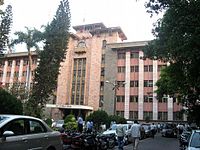Administration
Civic administration[edit]
The city of Pune is managed by the Pune Municipal Corporation (PMC) (पुणे महानगरपालिका). The Corporation consists of 149directly elected councillors,[84] who are led by the Mayor of Pune, a titular position mainly acting as an ambassador and representative of the city. Actual executive power is vested in the Municipal Commissioner, an officer of the Indian Administrative Service who is appointed by the Government of Maharashtra.
The Pune Municipal Corporation was ranked 8th out of 21 Cities for best governance & administrative practices in India in 2014. It scored 3.5 on 10 compared to the national average of 3.3.[85]
Pune Metropolitan Regional Development Authority (PMRDA) formed in 2015 is responsible for the integrated development of the metro region. Currently its jurisdiction extends over 3,500 km2 (1,351 sq mi).[86]
Apart from the PMC, four other administrative bodies are active within the Pune metropolitan region:
- Pimpri-Chinchwad Municipal Corporation (PCMC),[87] responsible for Pimpri-Chinchwad and its surroundings
- Khadki Cantonment Board (KCB),[88] responsible for Khadki
- Pune Cantonment Board (PCB),[89] responsible for Pune Cantonment
- Dehu Road Cantonment Board, responsible for the Dehu Road area
A plan to establish a single Pune Metropolitan Regional Development Authority (PMRDA), consisting of the combined municipal councils, corporations, and other local governments of Pune, Pimpri-Chinchwad, Lonavala, Talegaon, Bhor, Shirur, Saswad, the three cantonments and hundred villages near the city, has been considered since 1997, but has still not been put into place.[90] This body would be the executing authority which would acquire and develop reserve land to improve the infrastructure of the Pune metropolitan area.
The Pune Police is headed by the Police Commissioner of Pune, an officer of the Indian Police Service. The Pune Police report to the state ministry.
Military establishments[edit]
Pune was the largest military camp for the British forces during the Raj era, and the architecture in the Cantonment area is reminiscent of that era. The majority of the old Cantonment land in the city is now occupied by the Indian Army for housing its garrisons and officers.[91] The Southern Command, a World War II Indian Army formation, has its headquarters in Pune cantonment. The city is home to Lohegaon Aerodrome (previously RAF Station Pune), the city's airport and Indian Air Force airfield for theSukhoi-30MKI multi-role strike fighters.
The National Defence Academy (NDA) is an integrated military training centre that provides education up to the graduation level and joint training for cadets of the Army, the Navy, and the Air Force.[92] The NDA estate is spread over 8,028 acres (3,249 ha) of land in Khadakwasla near Pune and contains apart from NDA facilities, a mini sanctuary and Peacock Bay, a thumb-shaped inlet into the VIP residential area of the Faculty at the Academy, where the NDA sailing/boating facilities are housed. The lake itself is now known as Khadakvasla Lake, earlier known as Lake Fife in the British era, and is one of the lakes that provide water to Pune city.[93]
Pune hosts the College of Military Engineering, commonly referred to as CME, which trains students in Engineering subjects related to the military. It has the Armed Forces Medical College (AFMC), Pune, for medical study with nursing courses for the Indian army.
Pune and Khadki Area have centres of Bombay Sappers (Bombay Engineer Group), a regiment of the Indian Army Corps of Engineers.
Pune hosts the Military Intelligence Training School and Depot which offers diploma courses in Counter Intelligence, Combat Intelligence, Aerial Imagery and Interpretation, and others.[94]

